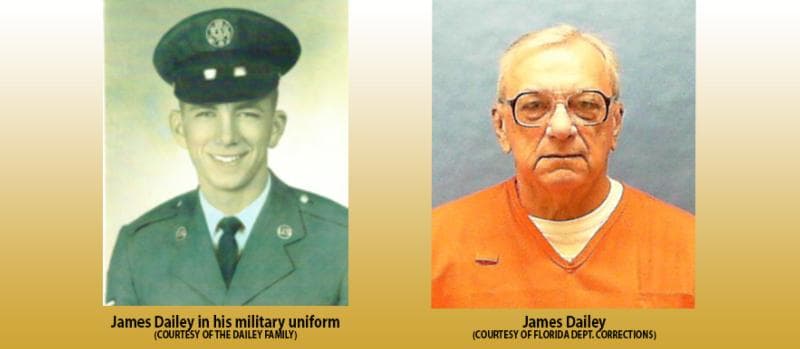TALLAHASSEE, Florida – James Dailey, a prisoner who has been on Florida’s death row for more than three decades and who has maintained his innocence, was granted a temporary stay of execution Oct. 23.
Although Florida Gov. Ron DeSantis had signed an execution warrant for Dailey, the U.S. District Court for the Middle District granted a 90-day stay, according to court documents.
Beginning Oct. 1, Dailey received representation from the Capital Habeas Unit, Middle District of Florida, which serves inmates during post-conviction sentencing and/or retrials. The 90-day stay is from that date of representation to Dec. 30. He was scheduled for execution Nov. 7.
Dailey is a U.S. Air Force veteran who honorably served in combat in Vietnam. Another man, Jack Pearcy, has confessed at least four times that he alone committed the murder and that Dailey is innocent.
Carol Wright, chief attorney for the Capital Habeas Unit, said in a statement that the unit was grateful for the court’s decision. The unit argued the stay was necessary in order to “allow for meaningful, conflict-free federal representation.”
“(The decision allows) Dailey’s newly appointed federal counsel time to present his new and substantial claims of innocence, so that they may finally be heard on the merits,” Wright stated. “We urge the attorney general and Gov. DeSantis not to appeal or otherwise oppose this limited stay in order to allow Mr. Dailey’s case to proceed under the timeline directed by the court.”
Dailey’s case and his maintaining of his innocence has caught the attention of many opponents of the death penalty, including the Witness to Innocence, Florida’s Catholic bishops and death-row exonerees.
While Wright and her team issued a letter to DeSantis, through the Florida Commission on Offender Review, urging them to conduct a clemency proceeding and permit a full hearing on his case, two Florida death-row exonerees — Juan Melendez and Herman Lindsey — and Ohio death-row exoneree Derrick Jamison hand-delivered a letter to DeSantis’ office in support of Dailey.
The letter was written on behalf of Melendez and Lindsey, and two other Florida exonerees — Ralph Wright Jr. and Joaquin Martinez — and detailed the similarities between Dailey’s case and each of their cases.
On Oct. 21, the eight Catholic bishops of Florida had written DeSantis, who is Catholic, urging him to stay Dailey’s execution at the Florida State Prison in Starke.
“While we urge you to stop every execution and end the use of the death penalty in Florida, this case of a veteran with evidence of innocence is especially alarming,” wrote the bishops.
Dailey was sentenced to death for the 1985 murder of 14-year-old Shelly Boggio, but Pearcy has signed a sworn affidavit that “he, and he alone, was responsible for the tragic death of Boggio,” the bishops said in their Oct. 21 letter to DeSantis.
“No physical evidence ties Mr. Dailey to the crime; however, the Florida Supreme Court refuses to allow him to present new evidence proving his factual innocence,” they wrote. “The direct killing of the innocent is always wrong and an intrinsic evil.”
The letter, released by the Florida Conference of Catholic Bishops in Tallahassee, was signed by: Archbishop Thomas G. Wenski of Miami; Bishop Felipe J. Estevez of St. Augustine; Bishop Gerald M. Barbarito of Palm Beach; Bishop John G. Noonan of Orlando; Bishop Gregory L. Parkes of St. Petersburg; Bishop Frank J. Dewane of Venice; Bishop William A. Wack of Pensacola-Tallahassee; and Auxiliary Bishop Enrique E. Delgado of Miami.
“Florida leads the nation in death-row exonerations. Florida makes more mistakes than any other state in sentencing innocent people to death,” the bishops said, adding that “there is strong evidence that James Dailey’s death sentence was yet another failure of justice.”
If carried out, his execution will be Florida’s 100th since the reinstatement of the death penalty in the 1970s. This is the third death warrant signed by DeSantis.
Florida is “a national outlier” in its high numbers of death sentences, death-row population and executions, the bishops said. “This use of the death penalty wounds our society by allowing a devaluation and coarseness of life in our community.”
“As Pope Francis has stated, and as the catechism has been updated to reflect, the death penalty is ‘inadmissible’ due to modern penal systems,” the bishops wrote.
“At certain times in history, the teachings of the church did not exclude recourse to the death penalty when it was the only means by which to protect society and guilt was properly determined,” they continued. “Today, however, alternative sentences, such as life without parole, are severe punishments through which society can be kept safe.”
Such alternatives “do not degrade us by ending yet another life — perpetuating, rather than ending, a cycle of violence,” they said.
Gonzalez is on the staff of the Florida Catholic, newspaper of the Archdiocese of Miami and the dioceses of Orlando, Palm Beach and Venice.
Crux is dedicated to smart, wired and independent reporting on the Vatican and worldwide Catholic Church. That kind of reporting doesn’t come cheap, and we need your support. You can help Crux by giving a small amount monthly, or with a onetime gift. Please remember, Crux is a for-profit organization, so contributions are not tax-deductible.














